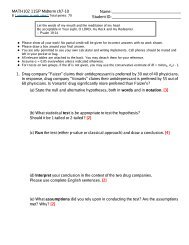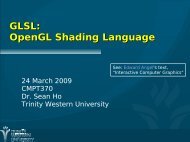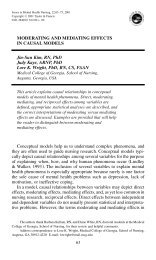OO Example: Fractions
OO Example: Fractions
OO Example: Fractions
- No tags were found...
You also want an ePaper? Increase the reach of your titles
YUMPU automatically turns print PDFs into web optimized ePapers that Google loves.
Creating a bare Fraction class class Fraction: Constructor, with optional arguments:● We want to hide the numer and denom:➢ def __init__(self, n=0, d=1):● self.__numer = n● self.__denom = d● Any potential problems/constraints? String representation, for print:➢ def __str__(self):● return "%d / %d" %(self.__numer, self.__denom)CMPT140: <strong>OO</strong>: fractions 20 Nov 20093
Using the Fraction class This is enough for us to create a Fraction object● a.k.a. “create a Fraction instance”● a.k.a. “instantiate the Fraction class” f1 = Fraction(2, 3) print f1 # “2 / 3” We can't do much with our Fraction object yet,so the next step is to implement some methods Multiple methods may want to check theconstraint of denom ≠ 0: make a helper methodCMPT140: <strong>OO</strong>: fractions 20 Nov 20094
Helper: check constraints Constraint: denom should never be 0 Don't want this to be publicly-accessible, sostart name with '__' (double-underscore):hidden from view in Python● In C++/Java, can declare it 'private' def __check(self): How to flag error? Use exceptions!➢ if denom == 0:● raise ZeroDivisionError● Up to whoever is using this Fraction tohandle the errorCMPT140: <strong>OO</strong>: fractions 20 Nov 20095
Set/get (mutator/accessor) We have hidden the attributes __numer and__denom from direct access by other programs We can give them read or write access to thoseattributes, but only through our methods:● Get method (accessor): def get_N():● Set method (mutator): def set_N(): This way we can do safety checking,e.g., check if denom is being set to 0 Potentially: security/permissions,who is modifying this attribute, logging, etc.CMPT140: <strong>OO</strong>: fractions 20 Nov 20096
Python customizations Now we can define the methods add, mul, etc.! Certain method names are special in Python: __init__: Called by the constructor when we setup anew instance __str__: Called by print __mul__: Overloads the (*) operator __add__: Overloads the (+) operator __le__: Overloads the (
e.g.: Multiplication method Multiplication (*) operator takes two operands:● self (the current Fraction object) andother (the other Fraction being multiplied): def __mul__(self, other):● e.g., if f2 and f2 are <strong>Fractions</strong>, then doingf1 * f2 is equivalent to f1.__mul__(f2)● self refers to f1, other refers to f2 Create a new Fraction object as the product: p = Fraction( self.get_N() * other.get_N(),self.get_D() * other.get_D() ) Then simplify and return the productCMPT140: <strong>OO</strong>: fractions 20 Nov 20098
Using customizations Now that we've written our multiplicationmethod with the special name __mul__(),we can do: f1 = Fraction(2, 3) f2 = Fracion (1, 2) print f1 # 2 / 3 print f2 # 1 / 2 print f1 * f2 # 2 / 6 The other operators /, +, -, and even < can bedefined similarly: operator overloading(extending definition of '*' to Fraction type)CMPT140: <strong>OO</strong>: fractions 20 Nov 20099

















